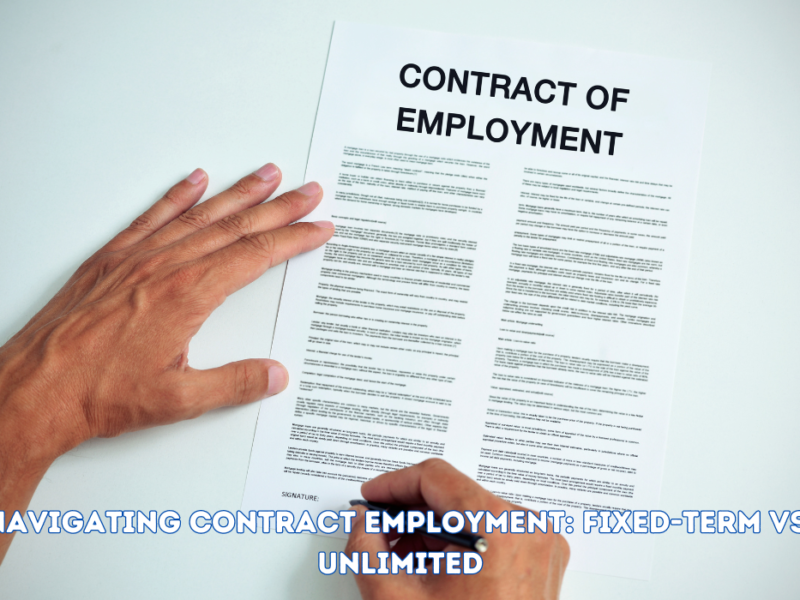In today’s dynamic job market, contract employment has become increasingly prevalent. Whether you’re a seasoned professional or just starting your career journey, understanding the nuances of contract employment is crucial. Two common types of contract arrangements are fixed-term and unlimited contracts. Each comes with its own set of benefits and drawbacks, and navigating between the two requires careful consideration.
Understanding Fixed-Term Contracts
Definition and Characteristics
Fixed-term contracts, as the name suggests, have a predetermined duration. They typically outline the start and end dates of employment, providing clarity for both the employer and the employee. These contracts are often used for project-based work or to cover temporary staffing needs.
Pros and Cons
Fixed-term contracts offer employers flexibility in managing their workforce, allowing them to scale up or down as needed without long-term commitments. For employees, these contracts provide the opportunity to gain experience in various roles and industries. However, they may also lack job security, as employment is contingent on the duration of the contract.
Exploring Unlimited Contracts
Definition and Features
Unlimited contracts, on the other hand, have no predefined end date. They establish an ongoing employment relationship between the employer and the employee, providing greater stability and security. These contracts are common in industries where continuity is essential, such as healthcare and education.
Advantages and Disadvantages
Unlimited contracts offer employees a sense of stability and long-term career prospects within a company. They provide access to benefits such as paid leave, healthcare, and retirement plans. However, they may limit flexibility and mobility, as employees are committed to the organization for an indefinite period.
Key Differences Between Fixed-Term and Unlimited Contracts
Duration
The primary difference between fixed-term and unlimited contracts is their duration. Fixed-term contracts have a specified end date, while unlimited contracts continue until terminated by either party.
Job Security
Fixed-term contracts may offer less job security compared to unlimited contracts, as employment is contingent on the duration of the contract. Unlimited contracts provide greater stability and continuity of employment.
Flexibility
Fixed-term contracts offer employers greater flexibility in managing their workforce, allowing them to adjust staffing levels based on project needs. Unlimited contracts provide employees with greater flexibility in planning their long-term career goals.
Factors to Consider When Choosing Between the Two
Nature of the Work
Consider the nature of the work and whether it is project-based or requires ongoing commitment. Fixed-term contracts are suitable for temporary or short-term projects, while unlimited contracts are ideal for roles that require long-term continuity.
Personal Preferences
Evaluate your personal preferences and career goals. Some individuals may prefer the flexibility of fixed-term contracts, while others may prioritize job security and stability offered by unlimited contracts.
Legal Considerations
Be aware of legal considerations related to contract employment in your jurisdiction. Familiarize yourself with local labor laws and regulations to ensure compliance and protect your rights as an employee.
Tips for Navigating Contract Employment
Researching the Company
Before accepting a contract offer, research the company thoroughly. Consider factors such as its reputation, financial stability, and employee satisfaction ratings.
Understanding the Contract Terms
Review the contract terms carefully, paying attention to details such as compensation, benefits, termination clauses, and renewal options. Seek clarification on any ambiguous or unclear provisions.
Seeking Legal Advice if Necessary
If you have any concerns or questions about your contract, don’t hesitate to seek legal advice. A qualified attorney can review the terms of your contract and provide guidance on your rights and obligations as an employee.
Conclusion
In conclusion, navigating contract employment requires careful consideration of various factors, including the nature of the work, personal preferences, and legal considerations. Whether you opt for a fixed-term or unlimited contract, it’s essential to understand the implications of your decision and make an informed choice that aligns with your career goals and aspirations.
FAQs
1. Can a fixed-term contract be renewed?
Yes, in many cases, fixed-term contracts can be renewed upon mutual agreement between the employer and the employee.
2. Are unlimited contracts more common in certain industries?
Yes, unlimited contracts are more common in industries where continuity and stability are paramount, such as healthcare, education, and government.
3. What happens if a fixed-term contract expires?
When a fixed-term contract expires, the employment relationship ends unless it is renewed or extended by mutual agreement.
4. Can I negotiate the terms of my contract?
Yes, you can negotiate the terms of your contract, including compensation, benefits, and duration, before accepting the offer.
5. Is it possible to transition from a fixed-term to an unlimited contract?
Yes, depending on the employer’s policies and the nature of the work, it may be possible to transition from a fixed-term to an unlimited contract.


Comments